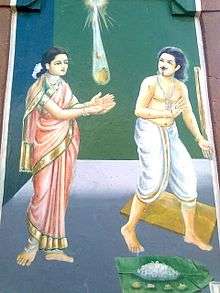Karaikkal Ammaiyar
for 1973 film based on her history, see Karaikkal Ammaiyar (film)

Karaikal Ammaiyar (meaning "the revered mother from Karaikkal"), one of the three women amongst the 63 Nayanmars, is one of the greatest figures of early Tamil literature. She was born at Karaikal, South India, and probably lived during the 6th century. She was a devotee of Shiva.[1]
Early life
Karaikal is a maritime trading city in Chola Nadu. Karaikal Ammaiyar, whose original name was Punithavathiyar, was born to Dhanathathanar in a merchant community known as Nattukottai Nagarathar (also Known as Nattukottai Chettiar) [2][3][4] She was married to Paramadattan, a wealthy merchant from Nagapattinam.
One day Paramadattan sent two mangoes to his house. Punithavathy kept them safely so that she could serve her husband with them at meal-time. In the meantime, a Shiva yogi appeared before her. He was hungry and completely exhausted. Punithavathy worshipped him and offered him bhiksha. She had nothing to give him, except the mangoes. She gave one to the guest.
At midday Paramadattan came to the house. The wife served him with one mango. He liked it, and asked for the other. She was upset as she had already given the other mango to the Siva yogi. She appealed to the Lord for help. When she finished her prayer, mysteriously a mango fell on the palm of her hand. She gave it her husband. He tasted it. It was exceptionally sweet. He asked her to tell him from where she got it, as he was quite sure it was not the mango he had sent.
Punithavathy told him the whole truth. Paramadattan, however, would not believe this and challenged her to produce another. She prayed again to the Lord. Another mango appeared on her palm. She gave it to him. But, at once it disappeared from his hand. He was astounded. He understood the greatness of his wife. He felt that it would be a great sin to continue living with her as her husband. On the pretext of going to a foreign country for trade, he sailed with a ship load of goods. On return, he established himself in a big city in the Pandyan kingdom. He married a merchant girl and lived happily. He had a daughter by her and he named her Punithavathy, after his first wife.
Meanwhile, Punithavathiyar's relatives came to know of her husband's whereabouts and took Karaikkal Ammaiyar also there in a palanquin. When Paramadattan heard that Punithavathy was coming to see him, he, with his second wife and child, went forward, and fell at Punithavathy's feet. When the people demanded an explanation, he revealed that he regarded her, not as his wife, but as a Goddess. Punithavathy understood his mental condition, and prayed to the Lord, "In that case, Oh Lord, deprive me of the present physical charm and let me have a demoniacal form."
Her prayer was immediately granted and her charming body was transformed into a skeleton.
Then she went on a pilgrimage to the mount Kailash. Feeling that it would be a great sin to place her foot on those sacred grounds, she made the last part of the journey on her head.
Lord Shiva called her as "Ammaiyae", meaning mother.
Notes
- ↑ V. K. Subramanian. 101 Mystics of India. Abhinav Publications, 2006 - Hindus - 219 pages. p. 33.
- ↑ "Nagarathar children trace their roots". The Hindu. 2016-08-16. Retrieved 2017-08-28.
- ↑ "Welcome to Nagarathar Ikkiya Sangam". nagaratharikkiyasangam.org. Retrieved 2017-08-28.
- ↑ "Karaikkal Ammaiyar Temple, Karaikkal | Aalayangal Arputhangal | 04/01/2016 | Puthuyugam TV". YouTube. Puthuyugam TV. 2016-01-04.
References
- Dallapiccola, Anna. Dictionary of Hindu Lore and Legend ( ISBN 0-500-51088-1)
- Karavelane (in French). Kareikkalammeiyar, oeuvres editees et traduites, institut francais d'indologie, Pondicherry (1956)
- Jagadeesan, N. The Life and Mission of Karaikkal Ammaiyar Bhattacharya, N.N. [ed] Medieval Bhakti Movements in India Munishiram Manoharlal, New Delhi (1989), pages 149–161
- Schouten, Jan Peter (in Dutch). Goddelijke vergezichten – mystiek uit India voor westerse lezers, Ten Have b.v., Baarn, the Netherlands (1996), ISBN 90-259-4644-5
- de Bruijn, Peter. Kāraikkālammaiyār: Part 1: An iconographical and textual study; Part 2: Poems for Siva ( ISBN 978-90-811564-1-7) 2007. 147 pp. colour, B/W plates.
- Craddock, Elaine Śiva's Demon Devotee: Kāraikkāl Ammaiyār, SUNY Press, Albany (2010), ISBN 978-1-4384-3087-4
- McGlashan, Alastair The History of The Holy Servants of the Lord Siva, page 161 Trafford (2006), ISBN 978-1-4120-7914-3
- Das, Sisir Kumar (2005). A History of Indian Literature, 500-1399: From Courtly to the Popular. 6. Sahitya Akademi. p. 31. ISBN 9788126021710.
External links
- Karaikal Ammaiyar
- Karaikkal Ammaiyar in Sri Lanka, article in Dutch on Karaikkalammaiyar
See also